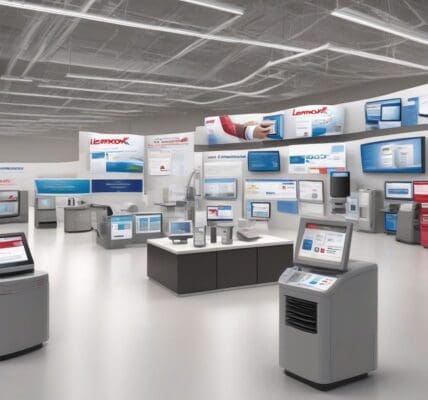The manufacturing industry is under significant threat from escalating cyber attacks, according to a recent report by KnowBe4. The findings highlight the urgent need for robust cybersecurity measures as threats become increasingly sophisticated.
In the report titled “Manufacturing: Maintaining Stability As Cyber Threats Explode in Volume and Sophistication,” KnowBe4, a security awareness training platform, sheds light on how cybercriminals are targeting this essential sector. The manufacturing industry accounts for over 25% of all cyber incidents in the top ten attacked industries, making it a prime target for hackers seeking valuable data and operational disruptions.
One striking statistic from the report indicates that malware attacks are now responsible for 45% of these incidents. Cybercriminals are particularly drawn to the interconnected nature of manufacturing, where components and processes rely heavily on complex technologies and supply chains. The low tolerance for operational downtime amplifies the risks, as manufacturers are less likely to withstand significant interruptions.
The data reveals that phishing remains the most prevalent method for initiating attacks. The simplicity and efficacy of phishing make it a favored strategy for cybercriminals. Additionally, the exploitation of public-facing applications is on the rise, underscoring the need for manufacturers to secure their external digital interfaces.
Notably, the Asia-Pacific region is currently the most targeted area, experiencing 54% of cyber incidents. Europe follows at 26%, while North America and Latin America account for 12% and 5% respectively. This geographical insight highlights that the threat landscape is not uniform; different regions face varying levels of risk that demand tailored cybersecurity strategies.
Ransomware continues to plague the manufacturing sector, with a staggering 56% increase in such attacks reported. The rise of extortion tactics only exacerbates the problem, as cybercriminals demand increasingly high ransom payments. This trend is particularly concerning, given that average ransom payments have surged by 88% to nearly USD $2.4 million in the past year. This escalation signifies not only the financial burden on manufacturers but also the risk of compromised sensitive data.
The report further presents data from KnowBe4’s Phishing by Industry Benchmarking Report. Smaller manufacturing enterprises perform relatively better in terms of phishing susceptibility, with a Phish-prone Rate of 27.9%, compared to a baseline of 34% for organizations lacking security training. In contrast, larger companies with more than 1,000 employees face a higher risk, with a Phish-prone Rate of 37.5%. This increase indicates that larger organizations may struggle with employee awareness around cybersecurity threats.
Stu Sjouwerman, CEO of KnowBe4, emphasizes the importance of proactive training and awareness in combating these threats. He points out that as the manufacturing sector increasingly relies on information technology and operational technology systems, it becomes more susceptible to cyber intrusions. Moreover, global supply chain dynamics mean that a single breach can have wide-reaching consequences, not just for individual manufacturers but also for the broader market and consumers.
Sjouwerman advocates that flexible and comprehensive security training programs are not merely good practices; they are essential. Equipping employees to recognize and respond to phishing and other social engineering attempts becomes a critical defense mechanism. A culture of cybersecurity awareness can significantly mitigate risks and enhance the overall security posture of the manufacturing industry.
As cyber threats evolve, so too must the defensive strategies employed by companies. The KnowBe4 report details several examples of recent cyber attacks across North America, Europe, Asia, and Oceania, illustrating the diverse challenges that manufacturers face in different locales. Each incident underscores the pressing need for tailored defenses that reflect the unique operational environments of the manufacturing sector.
In conclusion, the manufacturing industry stands at a critical juncture in terms of cybersecurity. With cyber threats on the rise and increasingly complex, businesses must prioritize cybersecurity training, implement comprehensive strategies to combat phishing and ransomware, and cultivate an organization-wide culture of awareness. Failure to adapt could lead to significant operational disruptions and financial losses that could impact not only the companies involved but also the entire supply chain.












